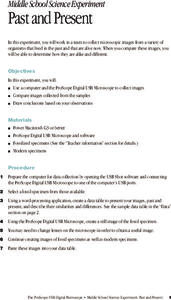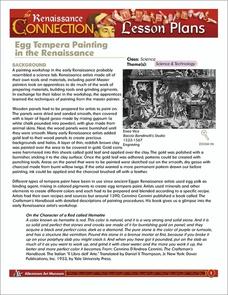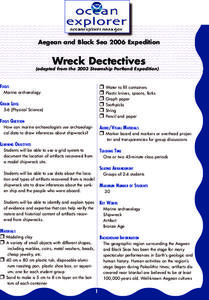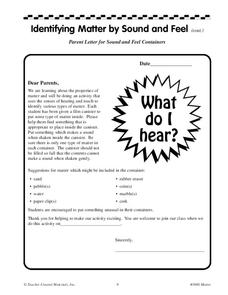Curated OER
Sand Dollars- Non-Fiction Comprehension Worksheet
In this sand dollar non-fiction reading comprehension worksheet, 5th graders read a 2 page selection about the life cycle and habitat of sand dollars. They use a dictionary and the article to define 10 words, and write the answer to 7...
Curated OER
Past and Present
Students compare fossilized specimens to contemporary specimens. They use a computer and a Proscope Digital USB Microscope to collect and compare images of ferns, sand dollars and sow bugs to those of similar fossilized samples.
American Museum of Natural History
The Amazing Mundo
Rocks and minerals are great on their own, but they also turn into some pretty amazing stuff! An online lesson explains the different types of materials we get from rocks and minerals, including glass, plastic, and coins. An embedded...
Curated OER
Sounds Like Science- Bottle Organ
Students investigate the relationship between pitches and notes. In this musical pitches and notes instructional activity, students use different sized bottles, water, and sugar to demonstrate different sounds. Students create musical...
Laboratory for Atmospheric and Space Physics
A Classroom Solar System
Create a scaled model of our solar system in your classroom! Scholars work collaboratively to build paper mache planets and hang them in their proper position to showcase each planet's location in the solar system.
Curated OER
Invertebrate Vocabulary-- Marine Invertebrate Match
In this science worksheet, students study 12 vocabulary words which pertain to marine invertebrates. Students read the definitions which include pronunciation, part of speech and meaning of the name. Students then look at 16 organisms...
Curated OER
Comparing and Contrasting
Students practice compare and contrast skills. In this science and language development lesson, students complete a T chart generating traits of a snail and a clam. Students complete a related worksheet.
Curated OER
Egg Tempera Painting In The Renaissance
Students explore the development of paint and paintings during the Renaissance. In a science lab, they reproduce the properties of egg in tempera paint and compare and contrast egg tempera paintings to oil paintings. Through...
Curated OER
Sounds Like Science - Bottle Organ
Students see that by manipulating sound we can arrange a series of notes referred to as a musical scale. They explain the relationship between pitches and notes. They compare the sounds of different-sized bottles.
Safe Drinking Water Foundation
To Filter or Not to Filter
Drinking clean water can be taken for granted. Explore the process and high cost of filtering water with a water pollution and filtration activity. Young scientist build a filtration system to filter polluted water, examine the economics...
Curated OER
Exploring Magnets and Magnetism
Here is a very good lesson on magnets, magnetism, and magnitic fields that is chock full of great activities for you to implement with your young scientists. Learners discover the properties of magnets, look at the forces of attraction...
Curated OER
Can Young Children Distinguish Between Living and Non-living Things?
What does it mean to be living? Help your young scientists identify living and non-living things as a result of their learning through discovery. Observation of and interaction with a set of natural phenomena in their community will make...
Curated OER
Wreck Detectives
Junior archaeologists examine types of artifacts from the Bronze Age on the internet. In collaborative groups, they create a story about a ship from this period and then construct a model of the ocean floor after their ship has sunk....
Curated OER
Identifying Matter by Sound and Feel
In this identifying matter by sound and feel worksheet, learners participate in an experiment to identify a wide variety of different types of matter in film containers supplied by each student.
Curated OER
Sea Otters--Funny Mammals of the Sea
In this sea otters learning exercise, students read a 2 page article on sea otters, define 12 vocabulary words from the article and answer 7 comprehension questions in complete sentences.
Curated OER
Fossil History
Students examine the similarities and differences between living organisms and fossils. In this fossil lesson plan students reenact the process of creating a fossil.
Curated OER
Dig It Up
Students participate in an archaeological excavation to determine how archeologists make inferences about various cultures. They reconstruct the site using layers of drawings. They discuss the kinds of information they learned.
Curated OER
Dimensional Analysis Worksheet
In this dimensional analysis worksheet, students solve six word problems using dimensional analysis to solve for an unknown. These include finding density, and converting from one unit to another. They also categorize samples as...
Curated OER
Wreck Detectives
Students investigate shipwrecks. In this marine archaeology lesson ,students collect data and make inferences about the causes of shipwrecks. Students work in groups to create their own model of a shipwreck using clay. Students then...
Curated OER
Zoology Word Search
In this word search worksheet, students locate words related to the zoology. The word list includes class echinoidea, pedicellaria, and paleozoic.
Curated OER
Inside-out Adaptations
Students describe sea stars adaptations and explain how these enable them to survive in different environments. In this animal adaptation lesson students watch a video, get into groups and create a list of characteristics of sea stars.
Curated OER
Factors affecting infiltration and runoff
Students investigate some of the factors that determine the amount of runoff. They are reminded that infiltration and runoff tend to work oppositely. When conditions are bad for infiltration they usually lead to runoff.
Curated OER
Moles, Stoichiometry, and Concentration
In this stoichiometry worksheet, students practice calculating moles, molar mass, and percentage composition of given compounds. This worksheet has 55 problems to solve.
Curated OER
Oddball Out: Shells
In this problem solving worksheet, students analyze a row of pictures of various shells to determine which creature is different from the others pictured.

























